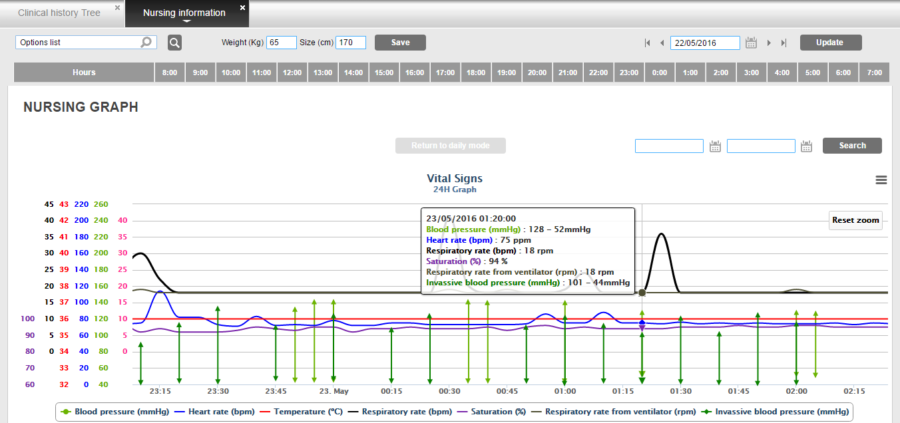Greater Accuracy and Efficiency of Care in Critical Patients in the ICUs with ehCOS SmartICU
The first phase of the ehCOS SmartICU pilot run has been succesfully completed in three modules of the ICUs at the Virgen del Rocio University Hospital.


Predicting the precise moment at which a critically ill patient will require a rapid and timely intervention by a health professional can avoid serious or irreversible episodes.
The first phase of the ehCOS SmartICU pilot run has been successfully completed in three modules of the ICUs at the Virgen del Rocio University Hospital, being this technology used in the care of 147 critical patients.
Medical device connectivity and interoperability benefit patient safety
Although we are immersed in the era of digital transformation and intensive use of healthcare information technologies, the data management systems have changed very little in recent years in the critical care units. At present, the majority of the clinical data and biosignals are collected from devices and carriers of disintegrated data. This, coupled with the lack of interoperability with applications like the Electronic Health Records and the use of paper instruments to support certain clinical management and care processes, obliges the healthcare providers to invest part of their time in manually saving data and creating reports and, moreover, causes a significant loss of information.
At this stage of the ehCOS SmartICU pilot run, the data and biosignals from 156 different devices, including monitors, ventilators and infusion pumps from various manufacturers, have all been integrated into a single, intuitive interface to increase accuracy in capturing data from the monitored patient and reduce information mechanization time in the management of nursing care and clinical reports by more than 10% in all cases.
All of this data is now interoperable with the electronic health record of the patient, which helps doctors and nurses have a more complete vision of the patient, including their medical history, such as allergies, lab results, studies, etc. to conduct a more accurate comprehensive and sequential analysis of information, explains Dr. Eduardo Vigil, Medical Director at NTTDATA and ehCOS and member of the research team of the project.
Usability: a crucial factor in technology adoption
One of the challenges in the implementation of technologies in the healthcare industry is user adoption. This is due especially to the complexity of the tasks and workflows that are developed, the stress levels of the environment, the productivity problems that may exist during the early months of implementation and the impact that inefficient usability can have on clinical productivity, error rates, user fatigue and overall dissatisfaction.
The ehCOS SmartICU solution is already being used by 95 clinical care professionals in three ICUs at the Virgen del Rocio University Hospital. The first usability study conducted in this phase reveals that, since the adoption of this system, ehCOS SmartICU has improved their productivity and efficiency by over 10% in tasks such as vital signs monitoring, care plans, checklists, medication, scales, water balance and losses, and clinical reports.
According to Maria Isabel Gonzalez, Chief of Nursing and Primary Nurse at the Virgen del Rocio University Hospital, “until now, the nursing brain sheet was paper-based due to the lack of usability and dissatisfaction with the existing applications. The work we have done in ehCOS SmartICU with the software engineers has been crucial to achieving a well-designed, usable and intuitive application, which is facilitating the adoption of the system in several modules of critical the care units”.

At the threshold of predicting the most frequent critical situations in ICUs
Predicting the precise moment at which a critically ill patient will require a rapid and timely intervention by a health professional can avoid serious or irreversible episodes and save many lives.
Data scientists at NTT DATA, in collaboration with the physicians and nurses at Virgen del Rocio University Hospital have developed predictive models for the most frequent critical episodes in intensive care units, such as acute hypotension, hypoxemia (low oxygen in the blood) and septic shock, according to Dr. Francisco Murillo, Head of Intensive care at the Virgen del Rocio University Hospital and principal investigator of the project.
At present, the developed predictive algorithms are being tested with actual data provided for research purposes by tens of thousands of Intensive Care Units (ICU) to databases such as MIMIC (Multiparameter Intelligent Monitoring in Intensive Care), a project led by a multidisciplinary team of researchers from MIT, with the participation of leading organizations in the worldwide healthcare industry.
In the upcoming months, the predictive algorithms will undergo validation with data obtained from the patients of the Hospital itself and then will go through a series of tuning techniques, which will raise the current level of accuracy. Using the validated and approved predictive models, we will build a mobile alert system, which will let clinicians know exactly when any of their patients are in danger of entering a serious complication. With this predictive application, we will start a new phase of the pilot from January 2017, which will bring an innovative improvement to the treatment of critical patients.
“With the results of this first test, we are planning to start the commercialization of the solution in November. The first step will be to present the product in Spain and the USA, then it will subsequently be presented in other markets such as LATAM and Asia”, indicates Mario Chao, CEO at everis and ehCOS partner.
.png)




